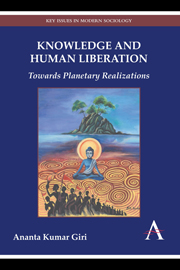Book contents
- Frontmatter
- Contents
- Preface
- Acknowledgments
- Foreword
- Introduction: The Calling of Transformative Knowledge
- Part I Nurturing the Garden of Transformational Knowledge: Roots and Variants
- 1 Knowledge and Human Liberation: Jürgen Habermas, Sri Aurobindo and Beyond
- 2 Beyond West and East: Co-evolution and the Calling of a New Enlightenment and Non-duality
- 3 The Modern Prince and the Modern Sage: Transforming Power and Freedom
- 4 Kant and Anthropology
- 5 Tocqueville as an Ethnographer of American Prison Systems and Democratic Practice
- Part II Rethinking Knowledge
- Part III Aspirations and Struggles for Liberation: Towards Planetary Realizations
- Afterword
- Advance Praise
4 - Kant and Anthropology
from Part I - Nurturing the Garden of Transformational Knowledge: Roots and Variants
Published online by Cambridge University Press: 05 May 2013
- Frontmatter
- Contents
- Preface
- Acknowledgments
- Foreword
- Introduction: The Calling of Transformative Knowledge
- Part I Nurturing the Garden of Transformational Knowledge: Roots and Variants
- 1 Knowledge and Human Liberation: Jürgen Habermas, Sri Aurobindo and Beyond
- 2 Beyond West and East: Co-evolution and the Calling of a New Enlightenment and Non-duality
- 3 The Modern Prince and the Modern Sage: Transforming Power and Freedom
- 4 Kant and Anthropology
- 5 Tocqueville as an Ethnographer of American Prison Systems and Democratic Practice
- Part II Rethinking Knowledge
- Part III Aspirations and Struggles for Liberation: Towards Planetary Realizations
- Afterword
- Advance Praise
Summary
In this chapter, we explore the challenge of rethinking modernist knowledge by looking at Kant's conception of anthropology. Kant taught courses in both anthropology and physical geography, and his book Anthropology from a Pragmatic Point of View was published nearly thirty years after his initial engagement with anthropology. While his lectures embodied Kant's crisis of identity as a professional philosopher, thus facilitating a border crossing between philosophy and anthropology, Anthropology from a Pragmatic Point of View was far short of his earlier critique of metaphysics and wanted anthropology to play by universal principles if not be totally subordinated to metaphysics. This book is especially interesting from the point of view of border crossing: “In this work Kant comes as close possible to combining the qualities of English and continental philosophy. The power of the intellect and the attraction of the imagination both merge into a system of common human concern which has more relevance today then it had before” (Zammito 2002). the word “pragmatic” in the text is important, and nearly two hundred years later new democratic possibilities seem to have arisen from border-crossing dialogue between traditions of american pragmatism and Kantian traditions, as in the works of Karl-Otto apel and Jürgen Habermas (as suggested in Chapter One). as we shall see in the case of the master himself (i.e. Kant), Rousseau was a major influence who inspired Kant to use the project of philosophical anthropology for the education of mankind.
- Type
- Chapter
- Information
- Knowledge and Human LiberationTowards Planetary Realizations, pp. 93 - 98Publisher: Anthem PressPrint publication year: 2013

